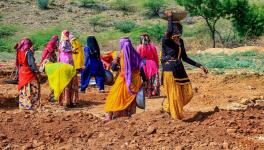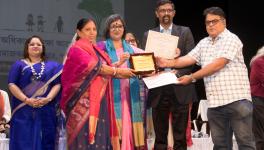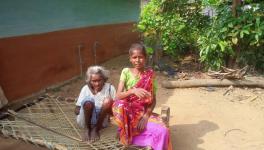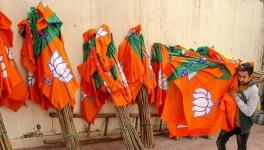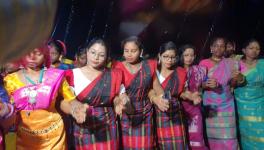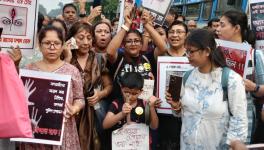Bengal: Women Risk Lives for a Living by Picking Saal Leaves in Dense Forests of Bankura's Jangal Mahal

Sukumoni Hansda and others from Barokurpa village under the Onda block of Bankura collecting saal leaves from the Aasna forest of Taldangra.
Sukumoni Hansda, Methri Murmu, Sraboni Tudu, Basonti Hansda, and Ramoni Hansda go for a morning walk of at least 10 kilometers every other day. Despite this being a healthy practice, their health is rapidly deteriorating. Not only these three women, but several poor, marginalised women of Bankura District in Jangal Mahal, have been venturing into the deep forest for years. In this forest, sunlight can't even be seen in the middle of the afternoon, and wild beasts roam freely. They collect saal leaves and branches of various trees from this forest, risking their lives. This is their main source of livelihood throughout the year. Through this arduous work, the women who gather these leaves provide food for their families and even cover their chidlren's educational expenses.
This reporter met Sukumoni Hansda and others, who came to collect saal leaves in the Aasna forest of Taldangra block from Ratanpur and Barokurpa villages under Ratanpur gram panchayat of Onda block, inside the forest. The forest is located 25 kilometres away from the district headquarters of Bankura and 170 kilometres from the state capital, Kolkata, in West Bengal.
Sraboni Tudu said, "We leave the house at the break of dawn. After walking 10 kilometres from Ratanpur, we enter this forest. The deep woods are still shrouded in darkness. Various animals roam around us, including poisonous snakes, foxes, wild boars, weasels, and scorpions."
A woman eating her food at the end of work
They shared that Nandini Ray, a housewife from Barokurpa village who came with them to collect leaves, died last year due to a snakebite.
By 2 pm, they finish gathering their leaves and put them all into sacks. This reporter noticed that everyone was eating Basi Bhat (stale rice), locally known as muri (fried rice), which they brought from home. The curry consists of raw onion, boiled potato, and green chilli.
Ramoni Hansda said, "In two hours, we will reach home by walking with these sacks of saal leaves and branches on our heads, as we cannot afford the bus fare."
Basonti Hansda said she would go to the nearby market to sell these leaves again the next morning.
The women said they must collect at least 1,000 saal leaves and a bundle of tree branches. If the collection falls short, spending a whole day in the forest would be in vain. Once the leaves are brought home, the elderly and school-going girls in the household attach the leaves to thin neem sticks, creating plates. Sometimes elderly women and school-going girls also join in to pick the saal leaves and branches.
Dulali Hansda said elderly persons like Saraswati Hansda, Mukta Murmur, and Sitamoni Murmur from Barokurpa, who are around 70 years old, are also involved in this work.
A similar scene unfolds in Muktator village of Saharjora Gram Panchayat under Barjora block, Bankura. Here, older women, younger family members, and neighbours venture into the forest to gather leaves and branches. However, this area is a tough terrain due to the presence of wild elephants.
In the past five years, seven people, including Minoti and Saptroshree Bauri, lost their lives due to elephant attacks during leaf collection in the Muktatorforest.
"Even under these dangers, we venture into the forest to gather leaves because there is no alternative employment to sustain ourselves," Sankari Bauri, daughter-in-law of the late Minoti Bauri, told this reporter.
Women returning home after their day's work.
Namita Bauria, a village resident, mentioned that once forest department guards and officials entered the forest and drove them away, citing fear of elephant attacks. "If the forest department cannot control the elephants, how are we supposed to live?" she said, with Rumpa Bauri, a tenth-grade student, agreeing with her.
Umar Imam, the District Forest Officer (DFO) of Bankura North Division, told this writer, "We advise women not to enter the forest for leaf collection due to safety concerns. Elephants migrate from the Dalma area and reside here. We are working to manage their movements."
In South Bankura, dense forests cover vast expanses across Ranibandh, Raipur, Sarenga, Simlapal, Hirbandh, and Khatra blocks. Most of the population here consists of tribal inhabitants who rely on the forest for their livelihood.
"We gather leaves from the forest and sell them at the local Ghoradhora and Kuilapal hat (local weekly market), and also take them to different shops in the local market for sale. The terrain of the forest is not even; you have to climb uphill to collect the leaves. Every year, several women die or sustain injuries in accidents along the way. We even have to cover our eyes while carrying leaves and branches on our heads," pointed out Kalpona Saren, a leaf collector from Ranibandh's Sutan area, highlighting the risks of this work.
A woman sewing saal leave.
Women who collect most of the leaves in these four blocks said a group of miscreants had been setting fire to the forest during the winter season for several years. As a result, the number of saal trees has decreased rapidly.
Bandana Mandi from Sanenga's Telijat village said they can now collect very few saal leaves, causing a family crisis.
When asked, DFO Bankura South Division, E Vijoy Kumar, acknowledged the incident of forest burning and stated that the forest guards keep an eye on the forest.
Many women from the Bankura districtssaid that the main source of income for the poor and marginalised people in rural areas was the work of the Mahatma Gandhi National Rural Employment Guarantee Act (MGNREGA) project, locally called 'Akso Diner Kaj' (Hundred days of work). However, this programme has almost shut down for two years across Bengal. They point out that they have not yet received the wages for their work in 2021. According to sources from the District NREGA Cell, wages totalling Rs 100.68 crore are still owed in Bankura district.
Additionally, mechanised farming has also reduced job opportunities in the area. A large number of male members from several families have gone to work as migrant labourers in other states. As a result, women have had to run the households. Therefore, they have said they have no other option but to sell saal leaves.
The women who collect leaves and branches from the forest have stated that some tree branches are used for household fuel. The rest are sold in bundles for Rs 50 to the poor families in the area, ICDS centres, and for cooking school mid-day meals.
Shyamoli Murmu, an elderly lady from Ranibandh, said they also sell raw saal leaves to local betel, sweet, and snack shops. They receive Rs 5 for 100 leaves. Shopkeepers have mentioned that various food items, from sweets to betel, are wrapped in saal leaves and fried in oil with spices for customers.
Additionally, 10 saal leaves are joined with small sticks to make a plate. In many rural homes, food is eaten on these leaf plates. Those who make these plates earn Rs 30 for every 100 plates. Furthermore, women sew two saal plates together with a machine to create a beautiful dish.
Aaroti and Kalyani Mahato from Keshra village in Ranibandh said they earn Rs 75 for every 1,000 plates they make. These plates are used to serve food to guests at various social events. Apart from the district headquarters in Bankura town, almost all the villages of the district sell these saal leaf plates. Its demand is increasing day by day.
The harsh reality is that, at the moment, these women of Jangal Mahal in Bankura are supporting their families while battling multiple adverse conditions by collecting and selling saal leaves. But till when, only time will tell.
The writer covers the Jangal Mahal region for ‘Ganashakti’ newspaper in West Bengal.
Get the latest reports & analysis with people's perspective on Protests, movements & deep analytical videos, discussions of the current affairs in your Telegram app. Subscribe to NewsClick's Telegram channel & get Real-Time updates on stories, as they get published on our website.












